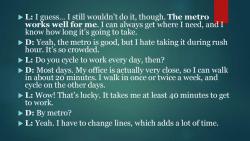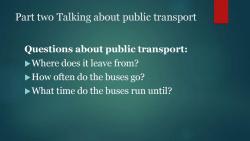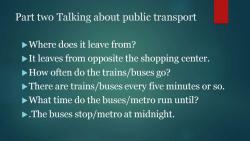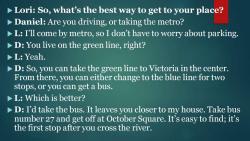《大学英语》课程教学课件(PPT讲稿)How to Talk About Transport

How to Talk About Transport WHATS THE BEST WAY TO GETAROUND YOUR HOMETOWN? WHAT PUBLIC TRANSPORTDO YOU USE REGULARLY?
How to Talk About Transport WHAT’S THE BEST WAY TO GET AROUND YOUR HOMETOWN? WHAT PUBLIC TRANSPORT DO YOU USE REGULARLY?

Part one How do you usually get around? I mostly public Patterns: transport. Im the subway. I either cycle or walk most I most places. places. Sometime I trams. Sometimes I the metro or taxi. I don't drive often. I used to cycle,but I don't I mostly the subway. have a bike any more. I most places. I walk if I'm going somewhere in my neighborhood. Sometimes,I trams
Part one How do you usually get around? I mostly use public transport. I either cycle or walk most places. Sometimes I take the metro or taxi. I mostly use the subway. I drive most places. Sometimes, I use trams. Patterns: I mostly take/use the subway. I drive most places. Sometimes I take/use trams. I don’t drive often. I used to cycle, but I don’t have a bike any more. I walk if I’m going somewhere in my neighborhood

Daniel:How do you usually get around? Lori:I mostly use public transport,so I'll take the metro,or sometimes buses.I have a car but I don't use it much in the city.What about you? D:I don't have a car,so I either cycle or walk most places. Sometimes I take the metro or a taxi if I'm going further, or if I'm out in the evening. L:You cycle?Here?That's brave!There's so much traffic. D:It's not that bad.Once you know the best routes,you can get anywhere in the city center quite fast.Often,it's faster than driving,because you can take small streets and you don't get stuck in traffic jams
Daniel: How do you usually get around? Lori: I mostly use public transport, so I’ll take the metro, or sometimes buses. I have a car but I don’t use it much in the city. What about you? D: I don’t have a car, so I either cycle or walk most places. Sometimes I take the metro or a taxi if I’m going further, or if I’m out in the evening. L: You cycle? Here? That’s brave! There’s so much traffic. D: It’s not that bad. Once you know the best routes, you can get anywhere in the city center quite fast. Often, it’s faster than driving, because you can take small streets and you don’t get stuck in traffic jams

L:I guess.I still wouldn't do it,though.The metro works well for me.I can always get where I need,and I know how long it's going to take. D:Yeah,the metro is good,but I hate taking it during rush hour.It's so crowded. L:Do you cycle to work every day,then? D:Most days.My office is actually very close,so I can walk in about 20 minutes.I walk in once or twice a week,and cycle on the other days. L:Wow!That's lucky.It takes me at least 40 minutes to get to work. D:By metro? L:Yeah.I have to change lines,which adds a lot of time
L: I guess. I still wouldn’t do it, though. The metro works well for me. I can always get where I need, and I know how long it’s going to take. D: Yeah, the metro is good, but I hate taking it during rush hour. It’s so crowded. L: Do you cycle to work every day, then? D: Most days. My office is actually very close, so I can walk in about 20 minutes. I walk in once or twice a week, and cycle on the other days. L: Wow! That’s lucky. It takes me at least 40 minutes to get to work. D: By metro? L: Yeah. I have to change lines, which adds a lot of time

Part two Talking about public transport What public transport do you have in your hometown?What do you use to get around? Most cities have buses.Big cities might have a metro or subway. There are different words for this,because many cities have their own name. In New York and Tokyo,it's the subway;in Moscow and Paris,it's the metro;in London,it's the Tube or the Underground;in Berlin,it's the U-Bahn,and so on
Part two Talking about public transport What public transport do you have in your hometown? What do you use to get around? Most cities have buses. Big cities might have a metro or subway. There are different words for this, because many cities have their own name. In New York and Tokyo, it’s the subway; in Moscow and Paris, it’s the metro; in London, it’s the Tube or the Underground; in Berlin, it’s the U-Bahn, and so on

Part two Talking about public transport All these words have the same meaning.If you aren't sure which to use, say 'metro'or 'subway'.Some cities have other kinds of public transport, like trams,light rail,or shared taxis.In many cities,you refer to metro lines by their colours.So,you might say: I live on the green line. Change to the blue line at Victoria. For the buses: Take bus number 27 and get off at October Square. You can catch the number two bus from just outside the metro station. Take the number three for five stops
Part two Talking about public transport All these words have the same meaning. If you aren’t sure which to use, say ‘metro’ or ‘subway’. Some cities have other kinds of public transport, like trams, light rail, or shared taxis. In many cities, you refer to metro lines by their colours. So, you might say: I live on the green line. Change to the blue line at Victoria. For the buses: Take bus number 27 and get off at October Square. You can catch the number two bus from just outside the metro station. Take the number three for five stops

Part two Talking about public transport Questions about public transport: Where does it leave from? How often do the buses go? What time do the buses run until?
Part two Talking about public transport Questions about public transport: Where does it leave from? How often do the buses go? What time do the buses run until?

Part two Talking about public transport Where does it leave from? It leaves from opposite the shopping center. How often do the trains/buses go? There are trains/buses every five minutes or so. What time do the buses/metro run until? .The buses stop/metro at midnight
Part two Talking about public transport Where does it leave from? It leaves from opposite the shopping center. How often do the trains/buses go? There are trains/buses every five minutes or so. What time do the buses/metro run until? .The buses stop/metro at midnight

Lori:So,what's the best way to get to your place? Daniel:Are you driving,or taking the metro? L:I'll come by metro,so I don't have to worry about parking D:You live on the green line,right? L:Yeah. D:So,you can take the green line to Victoria in the center. From there,you can either change to the blue line for two stops,or you can get a bus. L:Which is better? D:I'd take the bus.It leaves you closer to my house.Take bus number 27 and get off at October Square.It's easy to find;it's the first stop after you cross the river
Lori: So, what’s the best way to get to your place? Daniel: Are you driving, or taking the metro? L: I’ll come by metro, so I don’t have to worry about parking. D: You live on the green line, right? L: Yeah. D: So, you can take the green line to Victoria in the center. From there, you can either change to the blue line for two stops, or you can get a bus. L: Which is better? D: I’d take the bus. It leaves you closer to my house. Take bus number 27 and get off at October Square. It’s easy to find; it’s the first stop after you cross the river

L:Where does it leave from? D:The bus stop is right outside the metro station.You can't miss it! L:How often do the buses go? D:They're very regular.I don't know exactly,but I never wait more than 10 minutes,and normally much less. L:OK,I'll do that then.What time do the buses run until? I'm just thinking about getting back. D:The buses run until midnight,so you should be fine.The green line stops at one,right? L:It's a Friday,so it'll run until two o'clock.I don't think it'll be a problem. D:Great,so,see you tomorrow!
L: Where does it leave from? D: The bus stop is right outside the metro station. You can’t miss it! L: How often do the buses go? D: They’re very regular. I don’t know exactly, but I never wait more than 10 minutes, and normally much less. L: OK, I’ll do that then. What time do the buses run until? I’m just thinking about getting back. D: The buses run until midnight, so you should be fine. The green line stops at one, right? L: It’s a Friday, so it’ll run until two o’clock. I don’t think it’ll be a problem. D: Great, so, see you tomorrow!
按次数下载不扣除下载券;
注册用户24小时内重复下载只扣除一次;
顺序:VIP每日次数-->可用次数-->下载券;
- 《大学英语》课程教学课件(PPT讲稿)unit 3 answers.pptx
- 《大学英语》课程教学课件(讲稿)Unit 3 words to drill.docx
- 《大学英语》课程教学课件(PPT讲稿)unit 2 answers.pptx
- 《大学英语》课程教学课件(讲稿)Unit 3 language focus.docx
- 《大学英语》课程教学课件(PPT讲稿)unit 1 answers.pptx
- 《大学英语》课程教学课件(讲稿)Time-order signal words and expressions.pdf
- 《大学英语》课程教学课件(讲稿)How to introduce your hometown.pdf
- 《大学英语》课程教学课件(讲稿)Describe Your Hometown.docx
- 《大学英语》课程教学课件(PPT讲稿)How to talk about movie and film in ENGLISH.pptx
- 《大学英语》课程教学课件(讲稿)Conditionals.pdf
- 《大学英语》课程教学课件(讲稿)Unit 2 friendship words for drill.docx
- 《大学英语》课程教学课件(讲稿)Unit 2 Friendship language focus.docx
- 《大学英语》课程教学课件(PPT讲稿)Describing People’s Appearance.pptx
- 《大学英语》课程教学资源(书籍文献)英语四级翻译(华研外语).pdf
- 《大学英语》课程教学课件(PPT讲稿)How to Tell a Story in English.pptx
- 《大学英语》课程教学课件(PPT讲稿)How to Talk About the Past in English.pptx
- 《大学英语》课程教学课件(讲稿)Listen for the specific information.pdf
- 《大学英语》课程教学课件(讲稿)A digital detox.pdf
- 《大学英语》课程教学课件(讲稿)Unit 1 words and phrases to drill.docx
- 长治学院:《英语语音》课程教学资源(教案讲义).pdf
- 《大学英语》课程教学课件(讲稿)transportation in your hometown.docx
- 《大学英语》课程教学课件(讲稿)Unit 6 language focus.docx
- 《大学英语》课程教学课件(讲稿)Unit 6 words to drill.docx
- 《大学英语》课程教学课件(PPT讲稿)unit 6 answers.pptx
- 《大学英语》课程教学课件(讲稿)Topics for speaking(2024).docx
- 《大学英语》课程教学课件(PPT讲稿)Talk about your vacation.pptx
- 《大学英语》课程教学课件(PPT讲稿)unit 2(book 2)answers.pptx
- 《大学英语》课程教学课件(讲稿)Unit 2 Language focus.docx
- 《大学英语》课程教学大纲A.pdf
- 《大学英语》课程教学大纲B.pdf
- 《大学英语》课程教学大纲C.pdf
- 《大学英语》课程教学大纲A.pdf
- 《大学英语》课程教学大纲B.pdf
- 《大学英语》课程教学大纲C.pdf
- 《大学英语》课程授课教案(讲义,新视野)Unit 6 Book III NHCE.doc
- 《大学英语》课程授课教案(讲义,新视野)Unit Five Book III NHCE.doc
- 《大学英语》课程授课教案(讲义,新视野)Unit 7 Book 3.doc
- 《大学英语》课程授课教案(讲义,新视野)第四册 Unit 1.doc
- 《大学英语》课程授课教案(讲义,新视野)第二册 Unit 6.doc
- 《大学英语》课程授课教案(讲义,新视野)第二册 Unit 4.doc
